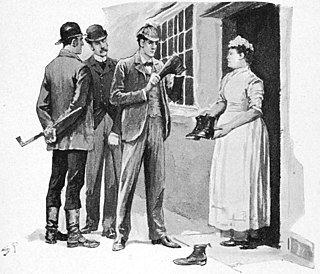
Alternate history is a subgenre of speculative fiction in which one or more historical events have occurred but are resolved differently than in actual history. As conjecture based upon historical fact, alternate history stories propose What if? scenarios about crucial events in human history, and present outcomes very different from the historical record. Some alternate histories are considered a subgenre of science fiction, or historical fiction.

Detective fiction is a subgenre of crime fiction and mystery fiction in which an investigator or a detective—whether professional, amateur or retired—investigates a crime, often murder. The detective genre began around the same time as speculative fiction and other genre fiction in the mid-nineteenth century and has remained extremely popular, particularly in novels. Some of the most famous heroes of detective fiction include C. Auguste Dupin, Sherlock Holmes, Kogoro Akechi, and Hercule Poirot. Juvenile stories featuring The Hardy Boys, Nancy Drew, and The Boxcar Children have also remained in print for several decades.

A fandom is a subculture composed of fans characterized by a feeling of camaraderie with others who share a common interest. Fans typically are interested in even minor details of the objects of their fandom and spend a significant portion of their time and energy involved with their interest, often as a part of a social network with particular practices, differentiating fandom-affiliated people from those with only a casual interest.

A fictional universe, also known as an imagined universe or a constructed universe, is the internally consistent fictional setting used in a narrative or a work of art. This concept is most commonly associated with works of fantasy and science fiction, and can be found in various forms such as novels, comics, films, television shows, video games, and other creative works.
Slash fiction is a genre of fan fiction that focuses on romantic or sexual relationships between fictional characters of the same sex. While the term "slash" originally referred only to stories in which male characters are involved in an explicit sexual relationship as a primary plot element, it is now also used to refer to any fan story containing a romantic pairing between same-sex characters. Many fans distinguish slash with female characters as a separate genre, commonly referred to as femslash.
A parallel universe, also known as an alternate universe, parallel world, parallel dimension, alternate reality, or alternative dimension, is a hypothetical universe co-existing with one's own, typically distinct in some way. The sum of all potential parallel universes that constitute reality is often called the "multiverse". Another common term for a parallel universe is "another dimension", stemming from the idea that if the 4th dimension is time, the 5th dimension—a direction at a right angle to the fourth—is a direction into any of the alternate spacetime realities.

Mystery is a fiction genre where the nature of an event, usually a murder or other crime, remains mysterious until the end of the story. Often within a closed circle of suspects, each suspect is usually provided with a credible motive and a reasonable opportunity for committing the crime. The central character is often a detective, who eventually solves the mystery by logical deduction from facts presented to the reader. Some mystery books are non-fiction. Mystery fiction can be detective stories in which the emphasis is on the puzzle or suspense element and its logical solution such as a whodunit. Mystery fiction can be contrasted with hardboiled detective stories, which focus on action and gritty realism.

A crossover is the placement of two or more otherwise discrete fictional characters, settings, or universes into the context of a single story. They can arise from legal agreements between the relevant copyright holders, common corporate ownership or unofficial efforts by fans.
Femslash is a genre which focuses on romantic and/or sexual relationships between female fictional characters.

The canon of a work of fiction is "the body of works taking place in a particular fictional world that are widely considered to be official or authoritative; [especially] those created by the original author or developer of the world". Canon is contrasted with, or used as the basis for, works of fan fiction and other derivative works.
Alternate reality often refers to parallel universes in fiction, a self-contained separate world, universe or reality coexisting with the real world, which is used as a recurring plot point or setting used in fantasy and science fiction.
Sherlock Holmes has long been a popular character for pastiche, Holmes-related work by authors and creators other than Arthur Conan Doyle. Their works can be grouped into four broad categories:
The Buffyverse canon consists of materials that are thought to be genuine and those events, characters, settings, etc., that are considered to have inarguable existence within the fictional universe established by the television series Buffy the Vampire Slayer. The Buffyverse is expanded through other additional materials such as comics, novels, pilots, promos and video games which do not necessarily take place in exactly the same fictional continuity as the Buffy episodes and Angel episodes. Star Trek, Star Wars, Stargate and other prolific sci-fi and fantasy franchises have similarly gathered complex fictional continuities through hundreds of stories told in different formats.

Fanfiction has encountered problems with intellectual property law due to usage of copyrighted characters without the original creator or copyright owner's consent.

Traditionally, the canon of Sherlock Holmes consists of the 56 short stories and four novels written by Sir Arthur Conan Doyle. In this context, the term "canon" is an attempt to distinguish between Doyle's original works and subsequent works by other authors using the same characters. Usually capitalized by fans of the Sherlockian game as "the Canon", the description of these 60 adventures as the Sherlock Holmes canon and the game of applying the methods of "Higher Criticism" to it was started by Ronald Knox as a playful use of the traditional definition of canon as an authoritative list of books accepted as holy scripture.
The Sherlockian game is the pastime of attempting to resolve anomalies and clarify implied details about Sherlock Holmes and Dr. Watson from the 56 short stories and four novels that make up the Sherlock Holmes canon by Arthur Conan Doyle. It treats Holmes and Watson as real people and uses aspects of the canonical stories combined with the history of the era of the tales' settings to construct fanciful biographies of the pair.
A shared universe or shared world is a fictional universe from a set of creative works where one or more writers independently contribute works that can stand alone but fits into the joint development of the storyline, characters, or world of the overall project. It is common in genres like science fiction. It differs from collaborative writing in which multiple artists are working together on the same work and from crossovers where the works and characters are independent except for a single meeting.

Fan fiction or fanfiction, also known as fan fic, fanfic, fic or FF, is fiction written in an amateur capacity by fans as a form of fan labor, unauthorized by, but based on, an existing work of fiction. The author uses copyrighted characters, settings, or other intellectual properties from the original creator(s) as a basis for their writing and can retain the original characters and settings, add their own, or both. Fan fiction ranges in length from a few sentences to novel-length and can be based on fictional and non-fictional media, including novels, movies, comics, television shows, musical groups, cartoons, anime and manga, and video games.

An original character (OC) typically refers to a type of fictional character that is created by a member of a fandom. They are a non-canonical character created by the author of fan fiction, a fan artist, or creator of another fan work, who exists within a certain fictional universe and may interact with existing characters or locations. The term can also be used in a wider sense to refer to any fictional character. There are also gender-specific acronyms like OMC and OFC.









